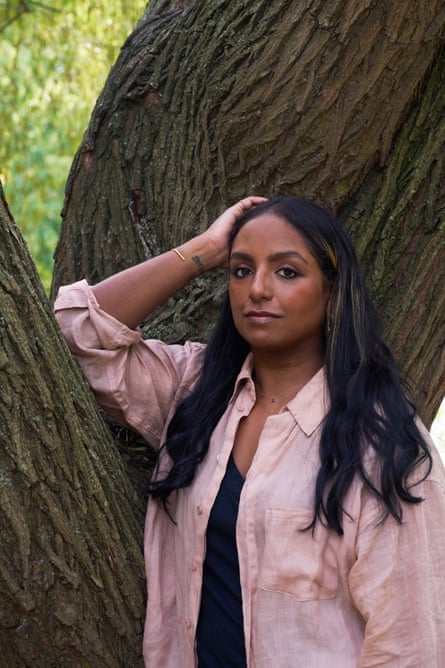 The unpredictability is a challenge … Anita Bhagwandas. Photograph: Suki Dhanda/The Observer
The unpredictability is a challenge … Anita Bhagwandas. Photograph: Suki Dhanda/The Observer
–

–
How do you scratch an itch that’s underneath your skin? The truth is, you can’t. At 15, I’d look down at my hands and see bubbles forming under the skin on my hands, becoming liquid-filled blisters that ached and itched until they popped. Grim, I know – and it didn’t get better as they healed; peeling the dressings off to change them was agony, while the claggy coldness of the wet wrap treatments is seared into my memory. What’s more, my now gauze-covered fingers were exactly the kicker my teenage self-esteem didn’t need.
My eczema, which is in its most basic terms a skin barrier malfunction as the result of genetics and environmental factors, began aged four. It was more rash-like then. I’d wonder why I was afflicted with it, and nobody else seemed to be. Kids would ask what it was, usually with mild disgust, which only made me feel ashamed. I had one ace up my sleeve though – my father was a dermatologist. “We tried everything to heal and manage it, but the only big difference I saw was after rounds of homoeopathy,” he recalls, after it was recommended by an old medic friend of his. And it did work; until I hit my teens.
Since then, I’ve never not had eczema, even if it’s just a small patch; but it’s also behaved completely differently each time it flared up. I started with more rash-like atopic eczema, while the ultra-itchy discoid eczema has also come and gone. Contact dermatitis, which I’ve had on/off too, occurs when the body touches a particular substance (nickel for me – I paint clear nail polish on the metal buttons on my jeans so it doesn’t touch my skin), and I’ve had patches of red, scaly seborrhoeic eczema on my scalp and brows. That horrendous blistering eczema from my teen years is dyshidrotic eczema (or pompholyx). As yet, there’s no sign of varicose eczema which commonly affects the lower legs, but I’m never one to do things half-heartedly, so, give it time.
There doesn’t seem to be a cure. I’ve been told it’s just a case of controlling it, which feels unfair, especially when it seems to affect children more – 1 in 5 children, and 1 in 10 adults in the UK suffer from eczema due to a mix of our “naive infant immune systems, sensitive skin barrier and exposure to potential environmental triggers,” Dr Derrick Phillips, consultant dermatologist at Montrose London tells me.
–
Studies have found that women are more likely to get it, as are those with a family history or who have hayfever and asthma too. Interestingly, US research has shown that the ethnic groups most affected are Native Americans, Pacific islanders and Asians, followed by White people. Black people are the least likely to have it. Other studies show that people in high-income regions, or those in higher social and economic classes are more prone to eczema – both attributed to environmental issues such as car pollution. Anecdotally, I realized that my ADHD medication – although useful for my focus – was dialing up my anxiety too (and research has shown a link between ADHD and eczema in children.)
My most recent and ongoing flare-up started in 2020 as I worked on my proposal for my book, Ugly. The stress of writing it caused a flare-up on my face and body but I thought it would just subside once I signed the book deal. Instead, it seemed to worsen. The timing was dire; at the time I was on TV regularly, trying to jovially give beauty advice with my face in weeping, flaking agony. At night, my body was so raw I would slather myself in multiple creams, wearing a onesie because the waistband and buttons of pajamas hurt my skin.
“It doesn’t look too bad, it’s not that red,” a harried GP told me during my eight-minute appointment, despite telling them of the above. But the truth is, if I’d been white, 70% of my body would have been bright red; it was a stark reminder, like so many other areas of health, the needs and differences of people of color are rarely considered.
–
I’ve often struggled to post on social media; doing a makeup tutorial when half my face is flaking off feels the opposite of inspiring
–
I finally sought specialist help. The dermatologist was shocked that I’d been ‘putting up’ with my eczema for so long. After two courses of oral steroids, topical steroid creams, Milton bleach baths (used to help lessen the itching and reduce bacteria growth) the symptoms abated briefly, only to return again.
Having eczema and working in the beauty industry has been a rollercoaster. I’ve often struggled to post on social media, where your face is often your currency; doing a makeup tutorial when half my face is flaking off feels the opposite of inspiring. But I’ve tried to do it regardless, to challenge the idea that we need to look perfect to be of value in the world.
–
When my eczema flared up again in 2020, among the steps suggested were phototherapy, a UV light therapy that needs weekly treatments over a couple of months, or drugs that control inflammation by suppressing the immune system such as cyclosporin or methotrexate, neither of which I wanted to try, especially during the pandemic.
It’s been a case of trial and error. Alongside potent topical steroid creams, I’ve removed most of the fragrances from my detergent and shower gels to minimize irritation. When my skin becomes irritated, I use the gentle Avène Tolerance range. Before I’d need to apply heavy moisturizers and oils twice a day, but the ceramides in CeraVe moisturizing cream have made a huge difference. I now use it once a day.
I also realized that despite having been fine with them previously, dairy and gluten now seem to cause a flare-up. “The unpredictability of eczema is a real challenge: it can be hard to pinpoint the triggers. Although food is unlikely to be the cause of eczema, food allergies can make eczema worse. We now also understand that the gut microbiome can influence eczema,” says Dr Thivi Maruthappu, consultant dermatologist and author of Skin Food. “People with eczema can also have low vitamin D levels and this seems to contribute to more severe skin inflammation, so it is important that you take vitamin D supplements through the winter months.” She also recommends omega-3, if you don’t get enough through your diet.
Traditional Chinese medicine practitioner Dr Mazin Al-Khafaji, founder of Dermatology M, specializes in bespoke skin management using herbs, topical products and acupuncture. “There is no question that sufferers of atopic eczema have a disordered skin barrier, but that is not the end of the story. Topical and systemic use of steroids really only address the acute phase of the inflammatory process. In contrast, Chinese medicine is able to very successfully treat the inflammatory stages to subdue eczema and beyond.”
Now my eczema is largely under control, but I’ve been looking for triggers to avoid any further flare-ups. The common thread for me seems to be stress; my earliest bouts coincided with starting a new school, others coincided with pressure-filled points in my life, so I’ve made serious lifestyle changes, namely meditation and slower, mindful movement like yoga – although that’s still a work in progress.
There have been other unexpected downsides including my skin thinning in some areas from the steroid creams: “There has been an explosion of eczema treatments in the past five years,” says Dr Phillips, citing the oral treatments dupilumab and JAK inhibitors plus tralokinumab injections that all aim to treat eczema internally, “and there are more novel treatments in the pipeline.”
So most of all I try to prioritize stress management. “The kind of pill you really need is chill pill,” my dad adds. Begrudgingly, I think he’s right.
–
Explore more on these topics













